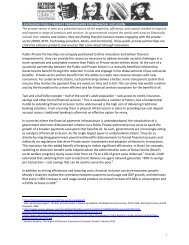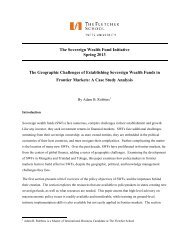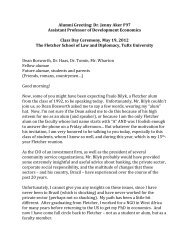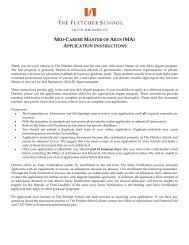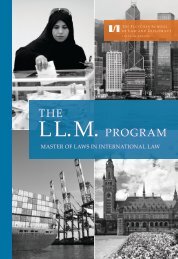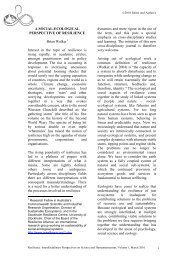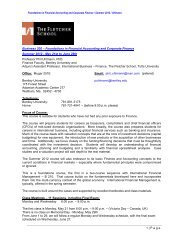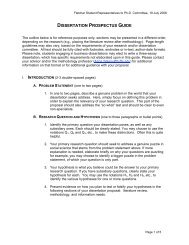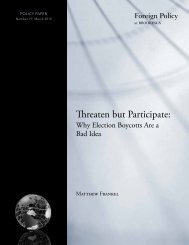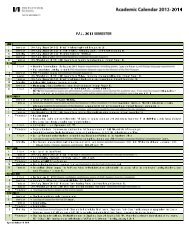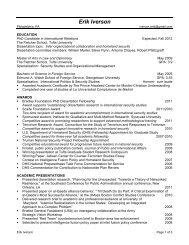Professor Richard H. Shultz, Jr. - Fletcher School of Law and ...
Professor Richard H. Shultz, Jr. - Fletcher School of Law and ...
Professor Richard H. Shultz, Jr. - Fletcher School of Law and ...
You also want an ePaper? Increase the reach of your titles
YUMPU automatically turns print PDFs into web optimized ePapers that Google loves.
Curriculum Vitae<br />
<strong>Pr<strong>of</strong>essor</strong> <strong>Richard</strong> H. <strong>Shultz</strong>, <strong>Jr</strong>.<br />
Current Positions<br />
<strong>Pr<strong>of</strong>essor</strong> <strong>of</strong> International Politics, The <strong>Fletcher</strong> <strong>School</strong>, Tufts University<br />
Since 1985 has taught courses <strong>and</strong> seminars at the graduate level. Courses taught include:<br />
The Role <strong>of</strong> Force in International Relations; The Evolution <strong>of</strong> Military Doctrine; The<br />
Origins, Conduct <strong>and</strong> Termination <strong>of</strong> War; Seminar on Intelligence, International<br />
Terrorism <strong>and</strong> National Security; Seminar on Armed Groups <strong>and</strong> Irregular Warfare;<br />
Seminar on Ethnic <strong>and</strong> Religious Conflict <strong>and</strong> Its Impact on Regional Security; <strong>and</strong><br />
Seminar on Crisis Management. Research Interests include: U.S. international security<br />
policy; irregular conflict, armed groups, <strong>and</strong> 21 st century security challenges; ethnic <strong>and</strong><br />
religious violence; irregular warfare; contemporary military strategy; intelligence policy<br />
<strong>and</strong> international terrorism; special operations forces <strong>and</strong> paramilitary operations;<br />
changing roles <strong>and</strong> the changing missions <strong>of</strong> armed forces.<br />
http://www.fletcher.tufts.edu/Research/Faculty-Research-Pr<strong>of</strong>iles/<strong>Shultz</strong>.<br />
Director, International Security Studies Program, The <strong>Fletcher</strong> <strong>School</strong><br />
Director <strong>of</strong> the International Security Studies Program (ISSP) since 1988. The ISSP<br />
prepares U.S. <strong>and</strong> international graduate students for public <strong>and</strong> private sector careers in<br />
national <strong>and</strong> international security policy. The program is dedicated to graduate level<br />
teaching <strong>and</strong> research on a broad range <strong>of</strong> conflict, defense, <strong>and</strong> strategic issues. The<br />
Director has responsibility for the following programmatic activities: course curriculum;<br />
annual conference co-sponsored with one <strong>of</strong> the U.S. military services; publication series;<br />
senior-level speaker series; military fellows program; crisis simulation exercises <strong>and</strong><br />
fundraising. The program consists <strong>of</strong> four faculty, the ISSP Administrator, the Program<br />
<strong>and</strong> Research Coordinator, a Staff Secretary, <strong>and</strong> several Research Associates.<br />
Doctoral <strong>and</strong> Post-Doctoral Studies<br />
Post Doctoral Studies, University <strong>of</strong> Michigan (1977-1978)<br />
Ph.D., Miami University (1976). Dissertation: “Origins <strong>and</strong> Development <strong>of</strong> U. S.<br />
Counterinsurgency Strategy: The Vietnam Case Study.” Chaired by David S. McLellan.<br />
1
Selected Pr<strong>of</strong>essional Activities<br />
• A Blueprint for Security Sector Reform for the 21st Century Project. There has<br />
been growing recognition that fragile <strong>and</strong> weak states are a principle source <strong>of</strong><br />
conflict across the globe. To meet these challenges U.S. policymakers have begun<br />
to recognize that they need for new tools <strong>and</strong> these include ones to address the<br />
dysfunctional security sector institutions <strong>of</strong> weak states. But they lack a blueprint<br />
for Security Sector Reform (SSR)-a conceptual framework that adapts SSR theory<br />
for addressing dysfunctional security sectors <strong>of</strong> fragile states, examines the state<br />
<strong>of</strong> capabilities across the U.S. government for addressing them, <strong>and</strong> identifies<br />
gaps that need to be filled. Over the next 18 months this project will produce a<br />
study that addresses these issues. It is a joint effort Dr. Querine Hanlon <strong>of</strong> United<br />
States Institute <strong>of</strong> Peace. Support comes from the Smith <strong>Richard</strong>son Foundation.<br />
• The Marine Campaign in Anbar Project. Completed in 2011 a three years in<br />
depth research project on the four year Marine Corps campaign in the al Anbar<br />
Province <strong>of</strong> Iraq. The period covered is from March 2004 through the first part <strong>of</strong><br />
2008. The research was conducted in co-operation with the History Division <strong>of</strong><br />
the U.S. Marine Corps. This arrangement provided access to the vast oral history<br />
collection <strong>and</strong> other research materials located at the History Division <strong>of</strong>fices in<br />
Quantico.<br />
• Senior Fellow, U.S. Special Operations Comm<strong>and</strong>-Joint Special Operations<br />
University. As a senior fellow I go abroad with SOCOM/JSOU staff to teach as<br />
part <strong>of</strong> joint military education missions. These take the form <strong>of</strong> one-two week<br />
“Regional Seminars” for foreign military <strong>and</strong> security pr<strong>of</strong>essionals. Recent<br />
programs included a programs held in Amman, Jordon in March 2012 <strong>and</strong> June<br />
2010 for <strong>of</strong>ficers <strong>and</strong> <strong>of</strong>ficials from Jordan, Lebanon, Egypt, UAE, Kuwait <strong>and</strong><br />
Qatar. In April 2011 a similar program was held in Douala, Cameroon for<br />
<strong>of</strong>ficers <strong>and</strong> <strong>of</strong>ficials from Cameroon, Chad, Congo, <strong>and</strong> Gabon.<br />
• Director, Armed Groups Project, National Strategy Information Center. Over<br />
the last two decades non-state armed groups to include terrorists, insurgents,<br />
militias, <strong>and</strong> criminal organizations have been proliferating in number <strong>and</strong><br />
importance. They now pose major security challenges to nation states <strong>and</strong> will be<br />
a major part <strong>of</strong> the 21 st century security l<strong>and</strong>scape. This project sought to<br />
underst<strong>and</strong> the complex nature <strong>of</strong> armed groups <strong>and</strong> to explore approaches for<br />
meeting these challenges. The project was conducted under the auspices <strong>of</strong> the<br />
Washington-based National Strategy Information Center (NSIC), building on the<br />
Center’s long st<strong>and</strong>ing efforts to institutionalize university teaching <strong>and</strong> research<br />
on various major dimensions <strong>of</strong> international security. The report <strong>and</strong> other<br />
products from the project--Adapting America’s Security Paradigm <strong>and</strong> Security<br />
Agenda are available at the projects website www.strategycenter.org.<br />
• Senior Fellow, Africa Center for Strategic Studies. The center is one <strong>of</strong> five U.S.<br />
Department <strong>of</strong> Defense regional centers for security studies. Its mission is to<br />
2
uild a comprehensive program <strong>of</strong> seminars, conferences, research, <strong>and</strong> outreach<br />
activities to promote good governance <strong>and</strong> democratic values in the defense<br />
sectors <strong>of</strong> African nations. In the summer <strong>of</strong> 2000, I taught courses on how the<br />
national security process functions in a democracy in Botswana <strong>and</strong> Gabon. The<br />
courses were attended by defense <strong>of</strong>ficial from over 30 African nations.<br />
• Guest Lecturer, Emirates Center for Strategic Studies <strong>and</strong> Research. The<br />
Emirates Center is an independent institute focusing on research <strong>and</strong> studies on<br />
security, economic <strong>and</strong> political issues <strong>of</strong> interest to the UAE <strong>and</strong> the Gulf region<br />
in particular <strong>and</strong> the Arab world in general. Between 1999 <strong>and</strong> 2003 I <strong>of</strong>fered an<br />
annual short course for UAE military <strong>and</strong> security <strong>of</strong>ficers. Topics included<br />
internal conflict, armed groups, <strong>and</strong> crisis management.<br />
• Research Fellow, Joan Shorenstein Center on the Press, Politics, <strong>and</strong> Public<br />
Policy, Harvard University. 1999 recipient <strong>of</strong> a Goldsmith Research Award from<br />
the Shorenstein Center to examine military-media relations in the post-Cold War<br />
period. Attention focused on the 1991 Gulf War <strong>and</strong> its aftermath.<br />
• General H.L. Oppenheimer Chair <strong>of</strong> Warfighting Strategy, U.S. Marine Corps.<br />
During the academic year 1997-1998 was recipient <strong>of</strong> the Oppenheimer Chair<br />
which is awarded annually to a senior level scholar or practioneer in national<br />
security affairs. The recipient conducts research <strong>and</strong> lectures at the Marine Corps<br />
Comm<strong>and</strong> <strong>and</strong> Staff College <strong>and</strong> related schools <strong>and</strong> comm<strong>and</strong>s.<br />
• Research Fellow, U.S. Army Special Operations Comm<strong>and</strong> 1997-1999.<br />
Recipient <strong>of</strong> a two-year research fellowship to study the use <strong>of</strong> covert paramilitary<br />
operations by the U.S. Military Assistance Comm<strong>and</strong> Vietnam’s Studies <strong>and</strong><br />
Observation Group during the Vietnam War. A third year <strong>of</strong> support for the<br />
writing <strong>of</strong> the manuscript was received from the Smith <strong>Richard</strong>son Foundation.<br />
The study was published by Harper Collins under the title The Secret War against<br />
Hanoi: Kennedy’s <strong>and</strong> Johnson’s Use <strong>of</strong> Spies, Saboteurs, <strong>and</strong> Covert Warriors in<br />
North Vietnam.<br />
• Senior Lecturer, George C. Marshall European Center for Security Studies. In<br />
the summer <strong>of</strong> 1998 <strong>of</strong>fered short courses at the Center focused on ethnic <strong>and</strong><br />
religious conflict. The Center, which is located in Germany, was established by<br />
the U.S. Department <strong>of</strong> Defense to promote a stable security environment by<br />
advancing democratic defense institutions <strong>and</strong> relationships among the nations <strong>of</strong><br />
America, Europe, <strong>and</strong> Eurasia.<br />
• Olin Distinguished <strong>Pr<strong>of</strong>essor</strong> <strong>of</strong> National Security Studies, U.S. Military<br />
Academy. During the academic year 1994-1995 was the recipient <strong>of</strong> the Olin<br />
Distinguished <strong>Pr<strong>of</strong>essor</strong> chair in the Department <strong>of</strong> Social Sciences at the U.S.<br />
Military Academy at West Point. The chair is awarded on an annual basis to a<br />
retired general <strong>of</strong>ficer or senior level academic.<br />
3
• Recipient, U.S. Army Outst<strong>and</strong>ing Civilian Service Medal. In June 1995 the<br />
medal was awarded for outst<strong>and</strong>ing service as the Olin Distinguished <strong>Pr<strong>of</strong>essor</strong> <strong>of</strong><br />
National Security Studies at the U.S. Military Academy.<br />
• Honorary Senior Research Fellow, St. Andrews University, Scotl<strong>and</strong>, Lectured<br />
annually on topics related to political violence <strong>and</strong> terrorism during 1993-1998 in<br />
the Department <strong>of</strong> International Relations.<br />
• Senior Guest Lecturer, Columbia University. During 1991 <strong>and</strong> again in 1992<br />
<strong>of</strong>fered a lecture series on low intensity conflict for the International Security<br />
Program <strong>of</strong> Columbia University’s <strong>School</strong> for International <strong>and</strong> Public Affairs.<br />
• Secretary <strong>of</strong> the Navy Senior Research Fellow, U.S. Naval War College. During<br />
the academic year 1990-1991 was awarded a chair at the Naval War College by<br />
the Secretary <strong>of</strong> the Navy. The chair was awarded annually to a senior academic<br />
to teach in the Policy <strong>and</strong> Strategy Department <strong>and</strong> to conduct research.<br />
• Research Fellow, United States Institute <strong>of</strong> Peace. During the summer <strong>of</strong> 1989<br />
received a research grant to focus on the question <strong>of</strong> whether specific guidelines<br />
on the use <strong>of</strong> covert action could be conceptualized within a policy framework<br />
that combined attention to both vital national interests <strong>and</strong> democratic principles.<br />
• Research Fellow, Hoover Institution on War, Revolution, <strong>and</strong> Peace, Stanford<br />
University. During 1986-1987 was recipient <strong>of</strong> a fellowship to research a book on<br />
Soviet promotion <strong>of</strong> insurgent movements in the Third World for publication by<br />
the Hoover Institution Press. It appeared in July 1988 under the title The Soviet<br />
Union <strong>and</strong> Revolutionary Warfare.<br />
• U.S. Government Consultancies. Since the mid-1980s served as a consultant to<br />
various U.S. government agencies concerned with national security affairs to<br />
include: the National Security Council; Department <strong>of</strong> Defense Office <strong>of</strong> the<br />
Undersecretary <strong>of</strong> Defense for Policy, Office <strong>of</strong> the Assistant Secretary <strong>of</strong><br />
Defense for Special Operations, <strong>and</strong> Joint Staff; different <strong>of</strong>fices within each <strong>of</strong><br />
the U.S. military services (mainly the Army <strong>and</strong> Marine Corps); the U.S. unified<br />
military comm<strong>and</strong>s to include the Special Operations Comm<strong>and</strong>, Southern<br />
Comm<strong>and</strong>, <strong>and</strong> Central Comm<strong>and</strong>; the State Department; <strong>and</strong> the U.S. Senate <strong>and</strong><br />
House Committees concerned with military <strong>and</strong> intelligence matters.<br />
Authored Books:<br />
Publications<br />
• The Marines Take Anbar: The Four-Year Fight to Defeat al Qaeda in Iraq This<br />
study is under contract <strong>and</strong> will be published by the Naval Institute Press in the<br />
late fall <strong>of</strong> 2012.<br />
4
• Insurgents, Terrorists, <strong>and</strong> Militias: The Warriors <strong>of</strong> Contemporary Combat<br />
(Columbia University Press, 2006; Paperback 2009) Co-authored with Andrea<br />
Dew. Dust cover endorsements include Senator John McCain, Seymour Hersh,<br />
<strong>Pr<strong>of</strong>essor</strong> Rohan Gunarata, <strong>Pr<strong>of</strong>essor</strong> Brice H<strong>of</strong>fman <strong>and</strong> Sir <strong>Richard</strong><br />
Dearlove. Reviews have appeared in several publications including Wall<br />
Street Journal, Foreign Affairs, Publishers Weekly, International Herald<br />
Review, Royal United Services Institute (RUSI) Journal, Military Review, <strong>and</strong><br />
Parameters.<br />
• The Secret War Against Hanoi: Kennedy <strong>and</strong> Johnson's Use <strong>of</strong> Spies,<br />
Saboteurs, <strong>and</strong> Covert Warriors in North Vietnam (New York: Harper Collins,<br />
1999, paperback 2000). Dust cover endorsements include Senator John<br />
McCain, Casper Weinburger, Frank Carlucci, General Wayne Downing,<br />
<strong>Pr<strong>of</strong>essor</strong> Colin Gray <strong>and</strong> Seymour Hersh. Reviewed widely in many<br />
publications including The New York Times, Economist, Wall Street Journal,<br />
Washington Post, Los Angeles Times, Foreign Affairs, New York Review <strong>of</strong><br />
Books, International Herald Tribune, Harpers, <strong>and</strong> Kirkus Review.<br />
• The Soviet Union <strong>and</strong> Revolutionary Warfare (Stanford, CA: The Hoover<br />
Institution Press, Stanford University, 1990, paperback 1992). Dust cover<br />
endorsements include <strong>Pr<strong>of</strong>essor</strong> Paul Seabury, <strong>Pr<strong>of</strong>essor</strong> Roger Kanet, David<br />
Ottaway <strong>of</strong> the Washington Post, <strong>and</strong> Senator David Durenberger. Forward by<br />
John Collins, Senior Defense Analyst, Library <strong>of</strong> Congress. Reviewed in<br />
Foreign Affairs, Slavic Review, American Political Science Review, Problems<br />
<strong>of</strong> Communism, Commentary, Baltimore Sun, Washington Times, <strong>and</strong> National<br />
Review.<br />
• Dezinformatsia: Active Measures in Soviet Strategy (New York: Brassey’s,<br />
1984, paperback 1985). Co-authored with Roy Godson. Dust cover<br />
endorsements include <strong>Pr<strong>of</strong>essor</strong> Adam Ulam, <strong>Pr<strong>of</strong>essor</strong> Fred Barghoorn, <strong>and</strong><br />
<strong>Pr<strong>of</strong>essor</strong> Uri Ra’anan. Forward by Sidney HookFive printings <strong>and</strong> republished<br />
as a mass paperback by Berkeley Publishing Group. Translated into<br />
French, Spanish, Greek, <strong>and</strong> Portuguese. Widely reviewed in numerous<br />
publications including the Wall Street Journal, Washington Post, Economist,<br />
National Review, New Republic, Foreign Affairs, <strong>and</strong> Commentary.<br />
Authored Monographs:<br />
• Strategic Culture <strong>and</strong> Strategic Studies: An Alternative Framework for<br />
Assessing Al Qaeda <strong>and</strong> the Global Jihadi Movement (Tampa, FL:<br />
USSOCOM/Joint Special Operations University Press, 1012).<br />
• Armed Groups <strong>and</strong> Irregular Warfare: Adapting Pr<strong>of</strong>essional Military<br />
Education (Washington, DC: National Strategy Information Center, 2009). Co-<br />
Authored with Roy Godson <strong>and</strong> Querine Hanlon.<br />
• Global Insurgency Strategy <strong>and</strong> the Salafi Jihad Movement (Boulder, CO:<br />
Institute for National Security Studies, 2008).<br />
5
• Armed Groups: A Tier-One Security Priority (Boulder, CO: Institute for<br />
National Security Studies, 2004). Co-authored with Itamara V. Lochard <strong>and</strong><br />
Doug Farah.<br />
• Ethnic <strong>and</strong> Religious Conflict: Emerging Threat to US Security (Washington,<br />
DC: National Strategy Information Center, 1994). Monograph.<br />
• In the Aftermath <strong>of</strong> War: US Support for Reconstruction <strong>and</strong> Nation-Building<br />
in Panama Following Just Cause (Montgomery, AL: Air Force University<br />
Press, 1993).<br />
Selected Op-eds:<br />
• “Counterinsurgency, by the Book,” The New York Times (August 7, 2006).<br />
Co-authored with Andrea J. Dew.<br />
• “Al Qaeda’s Growing Sanctuary,” The Washington Post (July 14, 2004). Coauthored<br />
with Douglas Farah.<br />
• “How Kennedy launched his Secret War in Vietnam,” The Boston Globe Jan.<br />
31, 2000).<br />
• “McCain has the Muscle to make Foreign Policy Work,” The Detroit News<br />
(February 21, 2000).<br />
Authored Journal Articles:<br />
• “States in the 21 st Century,” Geopolitics, History <strong>and</strong> International Relations 4:1<br />
(forthcoming 2012) Co-author with Querine Hanlon, Roy Godson, <strong>and</strong> Samantha<br />
Ravich.<br />
• “A QDR for all Seasons,” Joint Forces Quarterly (Sept. 2010).<br />
• “The Sources <strong>of</strong> Instability in the Twenty-First Century Weak States, Armed<br />
Groups, <strong>and</strong> Irregular Conflict,” Strategic Studies Quarterly (Summer 2011).<br />
• "Intelligence Dominance A Better Way Forward in Iraq," The Weekly St<strong>and</strong>ard<br />
(July 31, 2006). <strong>Richard</strong> H. <strong>Shultz</strong> <strong>Jr</strong>. & Roy Godson.<br />
• "Tactical Deception <strong>and</strong> Strategic Surprises in Al-Qai'da's Operations," MERIA<br />
Journal (Summer 2004). Co-authored with Ruth Beitler.<br />
• "Showstoppers: Nine Reasons Why We Never Sent Our Special Operations<br />
Forces After al Qaeda Before 9/11," The Weekly St<strong>and</strong>ard (January 26, 2004).<br />
• “It’s War! Post-11 September Global Terrorism," Terrorism <strong>and</strong> Political<br />
Violence (Spring 2003). Co-authored with Andreas Vogt.<br />
• “State Disintegration <strong>and</strong> Ethnic Conflict: A Framework for Analysis <strong>and</strong> Case<br />
Study,” ANNALS (Fall 1995).<br />
• “Iranian Covert Aggression: Support for Radical Political Islamists Conducting<br />
Internal Subversion Against States in the Middle East/Southwest Asia Region,”<br />
Terrorism <strong>and</strong> Political Violence (Spring 1995).<br />
6
• “Emerging Regional Conflicts <strong>and</strong> U.S. Interests: Challenges <strong>and</strong> Responses in<br />
the 1990s,” Studies in Conflict <strong>and</strong> Terrorism (January 1994). Co-authored with<br />
J. Marlow Schmauder.<br />
• “The Post-Conflict Use <strong>of</strong> Military Forces: Lessons from Panama, 1989-1991,”<br />
The Journal <strong>of</strong> Strategic Studies (June 1993).<br />
• “Compellence <strong>and</strong> the Role <strong>of</strong> Airpower as a Political Instrument,” Comparative<br />
Strategy (Fall 1992).<br />
• “The Low-Intensity Conflict Environment <strong>of</strong> the 1990s,” ANNALS (September<br />
1991).<br />
• “Low Intensity Conflict: Future Challenges <strong>and</strong> Lessons from the Reagan<br />
Years,” Survival (July/August 1989).<br />
• “Discriminate Deterrence <strong>and</strong> Low Intensity Conflict: The Unintentional Legacy<br />
<strong>of</strong> the Reagan Administration,” Conflict (June 1989).<br />
• “Covert Action <strong>and</strong> Executive-Legislative Relations: The Iran-Contra Crisis <strong>and</strong><br />
its Aftermath,” Harvard Journal <strong>of</strong> <strong>Law</strong> <strong>and</strong> Public Policy (June 1989).<br />
• “Oral History: A Neglected Dimension <strong>of</strong> Sovietology,” Strategic Review<br />
(Spring 1987).<br />
• “Can Democratic Governments Use Military Force in the War Against<br />
Terrorism? The U.S. Confrontation with Libya,” World Affairs (Fall 1986).<br />
• “Soviet Use <strong>of</strong> Surrogates to Project Power into the Third World,” Parameters<br />
(Fall 1986).<br />
• “Soviet Active Measures: Distinctions <strong>and</strong> Definitions,” Defense Analysis (No.<br />
2, 1985).<br />
• “The Role <strong>of</strong> External Forces in Third World Conflict,” Comparative Strategy<br />
(Fall 1983).<br />
• “Low Intensity Conflict <strong>and</strong> American Strategy in the 1980s,” Conflict<br />
Quarterly (Winter 1982).<br />
• Co-authored with Roy Godson a special issue <strong>of</strong> International Studies Notes<br />
(Winter 1983) devoted to teaching foreign intelligence. The three articles<br />
prepared for the issue include: “Teaching Foreign Intelligence;” “Intelligence -<br />
The Evolution <strong>of</strong> a New Teaching Subject;” <strong>and</strong> “Resource Materials on<br />
Intelligence.”<br />
• “Reassessing U.S. Strategy in Vietnam: The Impact <strong>of</strong> Past Lessons on Future<br />
Planning for Low Intensity Conflicts,” International Security (Winter 1980-<br />
1981).<br />
• “Coercive Force <strong>and</strong> Military Strategy: Deterrence Logic <strong>and</strong><br />
Counterinsurgency,” Western Political Quarterly (December 1979).<br />
• “Explaining American Intervention,” Journal <strong>of</strong> Politics November 1979).<br />
• “Responding to International Terrorism: Prevention <strong>and</strong> Control,” International<br />
Studies Notes (Spring 1979).<br />
7
• “The Limits <strong>of</strong> Terrorism in Insurgency Warfare: The Case <strong>of</strong> the Viet Cong,”<br />
Polity (Fall 1978).<br />
• “Breaking the Will <strong>of</strong> the Enemy During the Vietnam War: The<br />
Operationalization <strong>of</strong> the Cost-Benefit Model <strong>of</strong> Counterinsurgency,” Journal <strong>of</strong><br />
Peace Research (No. 2 1978).<br />
• “Conceptualizing Political Terrorism.” Journal <strong>of</strong> International Affairs (Summer<br />
1978).<br />
Authored Chapters in Books Edited by Other Authors:<br />
• "The Real Intelligence Failure on 9-11 <strong>and</strong> the Case for a Doctrine <strong>of</strong> Striking<br />
First,” in Terrorism <strong>and</strong> Counterterrorism, ed. by Russell D. Howard <strong>and</strong> Reid<br />
L. Sawyer (New York: McGraw-Hill, 2002). Co-authored with Andreas Vogt.<br />
• “Can American Democracy Employ Covert Action as an Instrument <strong>of</strong><br />
Statecraft,” in Legal <strong>and</strong> Moral Constraints on Low Intensity Conflict, ed. by<br />
Alberto Coll, James Ord, <strong>and</strong> Stephen Rose (Newport, RI: Naval War College<br />
Press, 1995).<br />
• “Conceptualizing Political Terrorism,” in International Terrorism:<br />
Characteristics, Causes <strong>and</strong> Controls, ed. by Charles W. Kegley (New York: St.<br />
Martin’s Press, 1990).<br />
• “Covert Action,” in Intelligence Requirements for the 1990s, ed. by Roy<br />
Godson (Lexington, MA: Lexington Books, 1989).<br />
• “Low Intensity Conflict: A Comparative,” in International Security <strong>and</strong> Arms<br />
Control, vol. II, ed. By Edward Kolodziej <strong>and</strong> Patrick Morgan (Westport, CT:<br />
Greenwood Press, 1989).<br />
• “Psychological Operations in Revolutionary Warfare: Threats, Opportunities<br />
<strong>and</strong> U.S. Policy,” in Psychological Operations <strong>and</strong> Political Warfare in US<br />
Strategy, ed. by Carnes Lord (Washington, DC: National Defense University<br />
Press, 1989).<br />
• “Soviet Intelligence Operations,” in The USSR Today <strong>and</strong> Tomorrow: Problems<br />
<strong>and</strong> Challenges, ed. by Uri Ra’anan <strong>and</strong> Charles M. Perry (Lexington, MA:<br />
Lexington Books, 1986).<br />
• “Soviet Strategy <strong>and</strong> Organization: Active Measures <strong>and</strong> Insurgency,” in The<br />
Red Orchestra, ed. by Dennis L. Bark (Stanford, CA: Hoover Institution, 1986).<br />
• “Low Intensity Conflict <strong>and</strong> U.S. Policy: Regional Threats, Soviet Involvement,<br />
<strong>and</strong> the American Response,” in Low Intensity Conflict <strong>and</strong> Modern<br />
Technology, ed. by David Dean (Montgomery, AL: Air University Press, 1986).<br />
8
• “Active Measures in Soviet Strategy,” in Soviet Foreign Policy in a Changing<br />
World, ed. by Erik H<strong>of</strong>fmann <strong>and</strong> Robbin Laird (Chicago, IL: Aldine Publishing<br />
Co., 1986).<br />
• “Countering Third World Marxist-Leninist Regimes: Policy Options for the<br />
United States,” in Vulnerabilities <strong>of</strong> Third World Marxist-Leninist Regimes:<br />
Implications for U.S. Policy (New York: Pergamon-Brassey’s, 1985).<br />
• “The Role <strong>of</strong> the Soviet Union in Promoting Insurgency in the Third World,” in<br />
National Security Strategy: Choices <strong>and</strong> Limits, ed. by Stephen Cimbala (New<br />
York: Praeger, 1984).<br />
• “Low Intensity Conflict: The Nature <strong>of</strong> the Soviet Role,” in Strategic Response<br />
to Conflict in the 1980s, ed. by William J. Taylor, <strong>Jr</strong>. (Lexington, MA:<br />
Lexington Books, 1984).<br />
• “Soviet Strategy <strong>and</strong> Support for International Terrorist Groups,” in The 1980s:<br />
Decade <strong>of</strong> Confrontation? (Washington, DC: The National Security Affairs<br />
Institute, 1982).<br />
• “American Strategies During the Vietnam War,” in Non-Nuclear Conflict in the<br />
Nuclear Age, ed. by Sam Sarkesian (New York: Praeger, 1980).<br />
• “Conceptualizing Political Terrorism: A Typology,” in International Terrorism<br />
(New York: <strong>School</strong> for International Affairs, Columbia University, 1980).<br />
Edited Books:<br />
• The Role <strong>of</strong> Naval in 21st Century Operations (Washington, DC: Brassey’s<br />
International Defense Publishers, 2000). Co-editor with Robert L. Pfaltzgraff,<br />
<strong>Jr</strong>.<br />
• War in the Information Age (Washington, DC: Brassey’s International<br />
Defense Publishers, 1997). Co-editor with Robert L. Pfaltzgraff, <strong>Jr</strong>.<br />
• Security Studies for the Twenty-First Century (Washington, DC: Brassey’s,<br />
1997). Co-editor with Roy Godson <strong>and</strong> George Quester.<br />
• Ethnic Conflict <strong>and</strong> Regional Instability: Implications for US Policy <strong>and</strong> Army<br />
Roles <strong>and</strong> Missions (Carlisle, PA: Strategic Studies Institute, U.S. Army War<br />
College, 1994). Co-editor with Robert L. Pfaltzgraff, <strong>Jr</strong>.<br />
• Security Studies for the 1990 (New York: Brassey’s, 1993). Co-editor with<br />
Roy Godson <strong>and</strong> Ted Greenwood.<br />
• Marine Expeditionary Forces: Into the Twenty-First Century (Quantico, VA:<br />
Marine Corps Foundation in 1993). Co-editor with Robert L. Pfaltzgraff, <strong>Jr</strong>.<br />
• Naval Forward Presence Missions <strong>and</strong> the National Military Strategy.<br />
Annapolis, MD: Naval Institute Press, 1993. Co-editor <strong>and</strong> author with Robert<br />
L. Pfaltzgraff, <strong>Jr</strong>.<br />
• The Future <strong>of</strong> Air Power in the Aftermath <strong>of</strong> the Gulf War. Montgomery, AL:<br />
Air University Press, 1992. Co-editor <strong>and</strong> author with Robert L. Pfaltzgraff, <strong>Jr</strong>.<br />
9
• U.S. Defense Policy in an Era <strong>of</strong> Constrained Resources (Lexington, MA:<br />
Lexington Books, 1989). Co-editor with Robert L. Pfaltzgraff, <strong>Jr</strong>.<br />
• Guerrilla Warfare <strong>and</strong> Counterinsurgency: U.S.-Soviet Policy in the Third<br />
World (Lexington, MA: Lexington Books, 1988). Co-editor with Robert L.<br />
Pfaltzgraff, <strong>Jr</strong>., Uri Ra’anan, <strong>and</strong> William Olson.<br />
• US-Soviet Doctrines <strong>and</strong> Technologies: Global <strong>and</strong> Regional Implications<br />
(Lexington, MA: Lexington Books, 1987). Co-editor with Uri Ra’anan <strong>and</strong><br />
Robert L. Pfaltzgraff.<br />
• Hydra <strong>of</strong> Carnage: The International Linkages <strong>of</strong> Terrorism (Lexington, MA:<br />
Lexington Books, 1985). Co-editor with Uri Ra’anan, Robert L. Pfaltzgraff,<br />
<strong>Jr</strong>., Ernst Halperin, <strong>and</strong> Igor Lukes.<br />
• Special Operations in US Strategy (Washington, DC: National Defense<br />
University Press, 1985). Co-editor with Frank R. Barnett <strong>and</strong> B. Hugh Tovar.<br />
• Power, Principles <strong>and</strong> Interests: A Reader in World Politics (Lexington, MA:<br />
Ginn Press, 1985). Co-editor with James P. O’Leary <strong>and</strong> Jeffrey Salmon.<br />
• Lessons from an Unconventional War: Reassessing U.S. Strategies in<br />
Preparing for Future Conflicts (New York: Pergamon, 1982). Co-editor with<br />
<strong>Richard</strong> Hunt.<br />
• Responding to the Terrorist Threat: Security <strong>and</strong> Crisis Management (New<br />
York: Pergamon, 1980). Co-editor with Stephen Sloan.<br />
10



